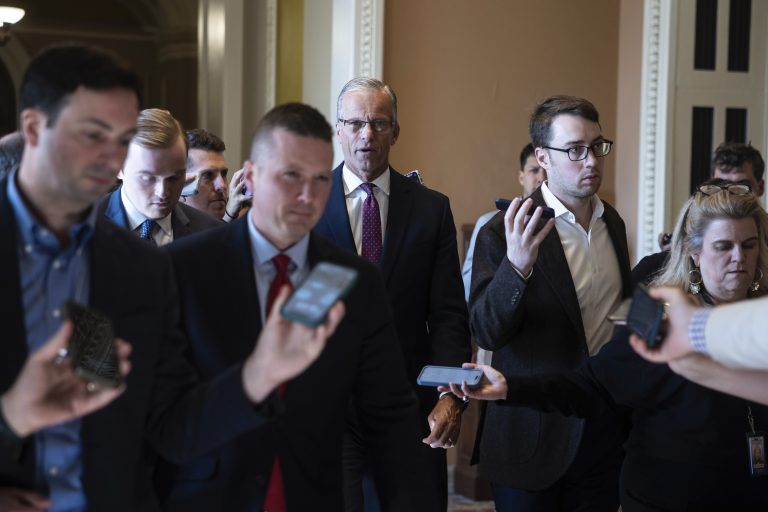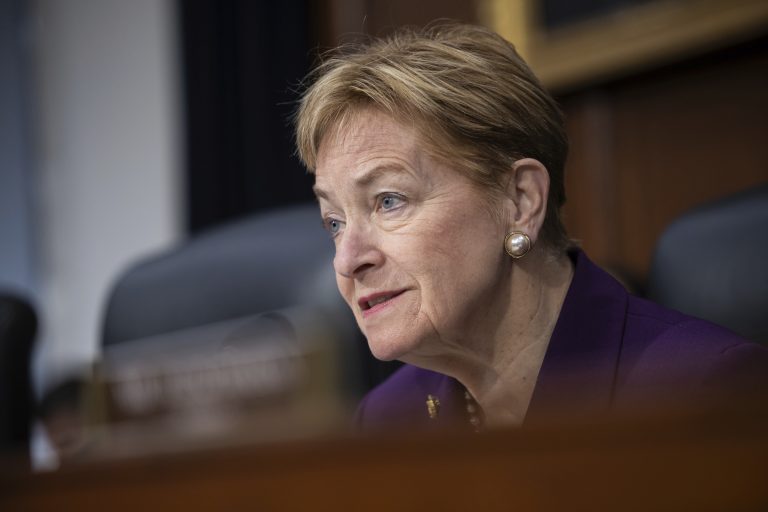Senate Republicans are scrambling to rewrite major parts of their “big, beautiful bill” in deference to key holdouts and the chamber’s parliamentarian as the clock ticks on a self-imposed deadline.
GOP leaders are aiming to start voting Thursday, but senators emerged from a closed-door briefing on the status of the megabill Monday night saying that some of their biggest sticking points — ranging from key tax decisions to a deal on Medicaid — remain unresolved.
The multitude of unresolved issues has left Republicans unsure when the bill will get to the Senate floor, even as leaders project confidence they are on track to pass it and send it back to the House this week — setting up final passage ahead of their July 4 target.
Most crucially, it could be Wednesday night or later before Senate Parliamentarian Elizabeth MacDonough finishes ruling on whether major tax provisions, including some measures at the very heart of the domestic policy bill, pass muster under the budget rules GOP lawmakers want to use to pass their bill on party lines.
“I think we’ll eventually pass something, I just can’t tell you when,” said Sen. John Kennedy (R-La.). “We’ve got a lot of stuff to work out, and the bill will be changed on the floor.”
Republicans had initially hoped to have a revised bill ready to be released Monday. Now they aren’t expected to release it while the parliamentarian’s review — the so-called “Byrd bath” — is pending, according to two people granted anonymity to discuss internal thinking.
Majority Leader John Thune (R-S.D.) said that he hoped to be able to hold an initial vote on Thursday, setting up passage over the weekend, but that “part of it right now is the Byrd bath, and it’s taking a little bit longer.”
It’s not just the procedural hoops senators have to jump through. Multiple substantive matters need to be settled, including a high-stakes dispute between the House and Senate GOP over a key tax break.
Sen. Markwayne Mullin (R-Okla.) briefed his colleagues on talks he’s brokering with House Republicans on raising the state-and-local-tax deduction cap, known as SALT. Mullin signaled afterward he thought they were getting close to “acceptance” on what the final proposal would entail.
A $40,000 cap negotiated by the House would not be touched, he suggested, but an income threshold where the deduction starts to phase out could be lowered. But that combination was publicly rejected by SALT-focused House members just days ago, and several GOP senators left the briefing under the impression that Mullin was only laying out potential options and did not have anything resolved.
Beyond the tax fight, Republicans are still working through thorny Medicaid issues. Thune told GOP senators during the closed-door meeting that the Senate would follow the House’s lead in one key respect — it would not change the share of Medicaid costs the federal government pays for those enrolled under the program’s 2010 expansion, according to Missouri Sen. Josh Hawley.
GOP leaders also discussed including a fund to help offset the impact to rural hospitals due to other Medicaid changes in the Senate bill. POLITICO reported Monday that the fund is expected to be included in the bill, but Republicans say they have not yet gotten details on how it would work.
“I am absolutely happy with a rural fund; I think that would be great,” Hawley said. “Will that solve the issue? I don’t know.”
Senate Republicans included language in their bill to curtail provider taxes, which most states use to fund their Medicaid programs and garner larger federal reimbursements. House GOP leaders, who chose only to freeze those taxes, are increasingly worried that they’ll have to spend weeks more negotiating the megabill if the Senate doesn’t quickly retreat from some of its proposed changes.
Hawley said that he has been talking to House leaders who are warning that the language can’t pass their chamber, necessitating a time-consuming “conference” with the Senate. Speaker Mike Johnson has urged senators to keep their changes to the House-passed bill to a minimum but senators have eyed major changes to the tax package while sanding down some of the proposed spending cuts.
At Monday’s briefing, Sen. Thom Tillis of North Carolina handed out a paper that estimated how much Medicaid funding several states, including his and Hawley’s, would lose under the Senate provider tax proposal.
Republicans are also getting heartburn as MacDonough warns that several key provisions do not comply with the strict rules governing what can be included under reconciliation, which lets them skirt a 60-vote filibuster.
For instance, a plan to shift some food-aid costs to states, generating tens of billions of dollars in savings, is in flux after MacDonough ruled over the weekend that the scheme, which penalized states for their payment error rate, did not comply. Senate Agriculture Committee Republicans are hoping they can salvage the plan with relatively small changes.
Losing the cost-sharing proposal would be a setback for leadership, which is already facing pushback from House and Senate conservatives who believe the bill doesn’t go far enough on cutting spending. Rep. Andy Harris (R-Md.), chair of the hard-right House Freedom Caucus, warned Monday that if the bill “should pass the Senate in its current rumored form, it probably would have trouble in the House.”
MacDonough has also warned that an effort championed by Sen. Mike Lee (R-Utah) to overhaul the federal rulemaking process does not comply with reconciliation rules, but Republicans expect Lee could try to revive it as a floor amendment. Lee and Sens. Rick Scott (R-Fla.) and Ron Johnson (R-Wis.) met separately with Trump on Monday as the president steps up his efforts to win over the trio of outspoken fiscal conservatives. Trump, according to Scott, said that he supports full repeal of clean energy tax credits enacted under predecessor Joe Biden, as well as a focus on waste, fraud and abuse in Medicaid.
Senate conservatives later relayed Trump’s message Monday evening to a closed-door Freedom Caucus meeting, according to four people granted anonymity to describe the gathering.
The centerpiece of the GOP package — its tax and health care language — remains under review with MacDonough. Senate Finance Committee staff met with her Monday to discuss the health provisions and are expected to reconvene on Tuesday to go over the tax language.
Final rulings are not expected to be finished until Wednesday at the earliest — less than a day before Thune wants senators to start voting.
Meredith Lee Hill and Benjamin Guggenheim contributed to this report.


